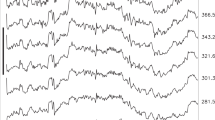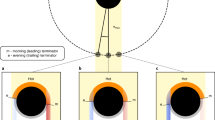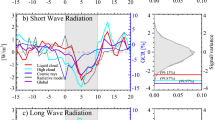Abstract
IN two earlier communications1,2 I drew attention to the fact that the discrepancy between theory and observation in respect of the light curves of meteors pointed out by Hawkins and Southworth3 apparently necessitates a modification of the conventional theory of meteor luminosity. There is a better fit between theory and observation if the luminous efficiency factor is assumed to be proportional to the atmospheric density at every point of the meteor trail. However, no physical justification was adduced for such an assumption.
This is a preview of subscription content, access via your institution
Access options
Subscribe to this journal
Receive 51 print issues and online access
$199.00 per year
only $3.90 per issue
Buy this article
- Purchase on Springer Link
- Instant access to full article PDF
Prices may be subject to local taxes which are calculated during checkout
Similar content being viewed by others
References
Ananthakrishnan, R., Nature, 187, 675 (1960).
Ananthakrishnan, R., Nature, 190, 896 (1961).
Hawkins, G. S., and Southworth, R. B., Smithsonian Contrib. Astrophysics, 2, 349 (1958).
Thomas, R. N., Heat Transfer and the Ablation Process in Meteors, Proc. Symp. on Meteor Physics, edit. by Kaiser, T. R. (Pergamon Press, 1955).
Author information
Authors and Affiliations
Rights and permissions
About this article
Cite this article
ANANTHAKRISHNAN, R. Meteor Luminosity and Meteor Ionization. Nature 210, 402–403 (1966). https://doi.org/10.1038/210402a0
Issue Date:
DOI: https://doi.org/10.1038/210402a0
Comments
By submitting a comment you agree to abide by our Terms and Community Guidelines. If you find something abusive or that does not comply with our terms or guidelines please flag it as inappropriate.



